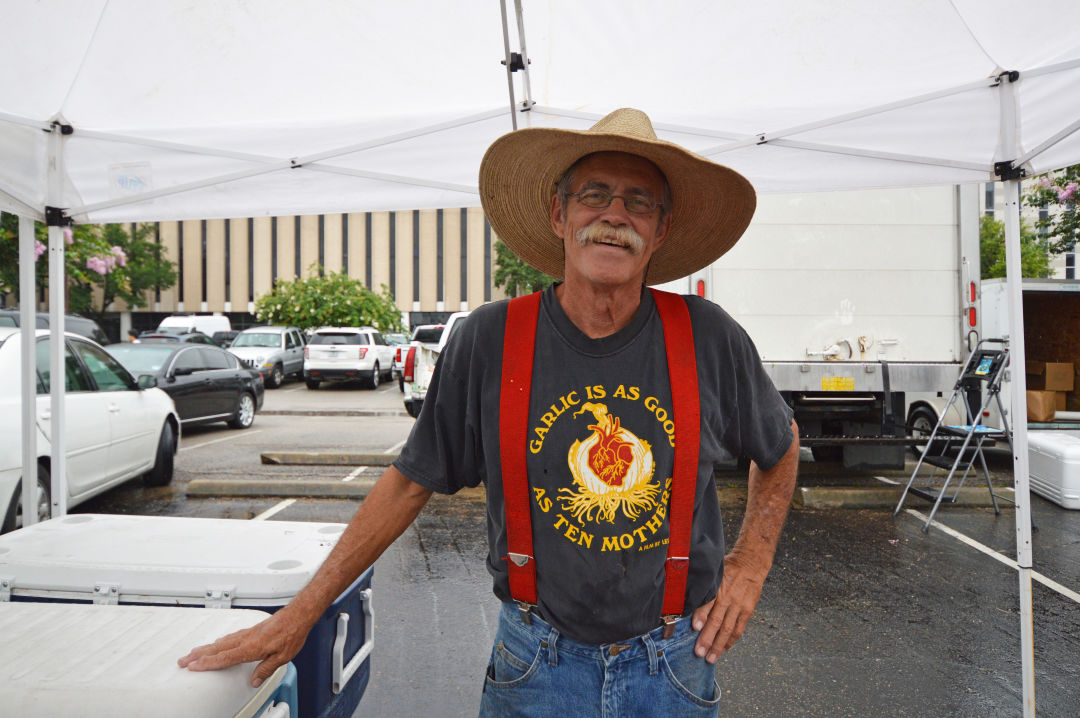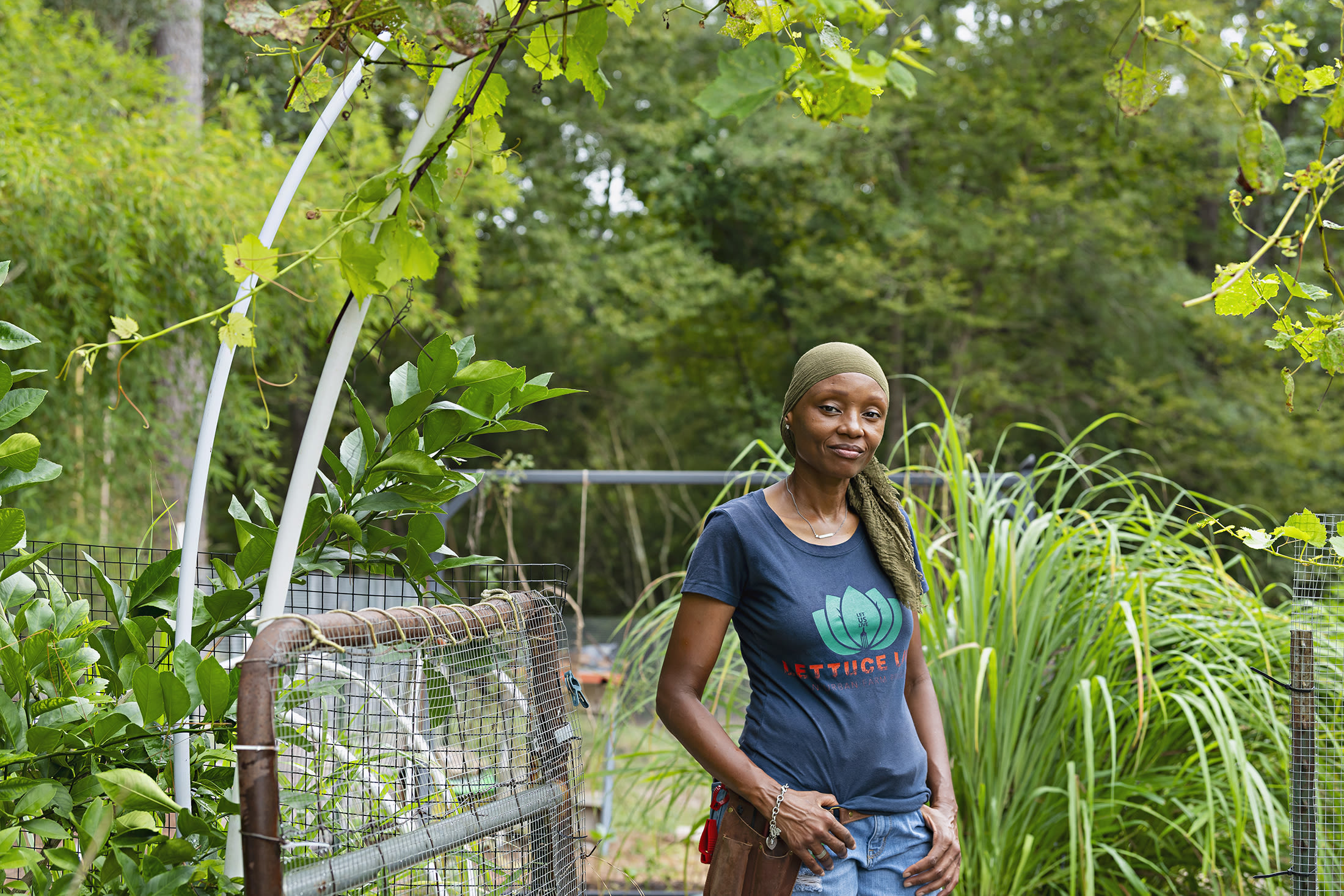Made in Houston: Laughing Frog Farm

Glen Miracle, the man behind Laughing Frog Farm.
Image: Ellie Sharp
Name and location: Laughing Frog Farm, Hempstead, Tx.
Age of business: 7 years
Type of product: Organic produce, eggs, Gulf Coast native sheep, citrus trees
Where to find it: Urban Harvest Farmers Market – Eastside
* * *
One evening in January 2002, farmer Glen Miracle finished his day of pouring piers for the house he was building. When he tried to leave, his truck got stuck in the thick mud that had accumulated from intense rains. When his wife arrived with a six-pack, the two sat on the tailgate sipping as dusk fell around them. The frogs in their pond took up a chorus and his wife said, “Glen, all the frogs are laughing at you.” Seven years later, Miracle farms full-time, except for the occasional painting job to get him through August. Despite all that hard work, he still calls farming his hobby. We sat down with him to learn more about his passion project.
Houstonia: What inspired you to become a farmer?
Glen Miracle: I had always been incredibly interested in living in a rural area, very interested in growing my own food and having my own food. My grandfather was one of those farmers who grew pretty much 90 percent of what he ate—all the meat and vegetables—only went into town one day a month to buy corn flakes, and wheat and sugar. I always thought that was pretty cool and [wondered] can you do that today? [This was 1978]. That’s what got me interested. Then I started getting more and more disgusted with what they were putting into our food—pesticides, etcera, and we started raising a 10-foot-by-10-foot garden in our front yard to grow the kinds of things that had the most pesticides. Now we produce about 75 percent of our food through our gardens and our meat.
Houstonia: Have you always been interested in food?
GM: I grew up with a very large garden—all I could think of was getting out of country and into city. I majored in theater in school and became fairly accomplished in the arts, joined the Houston Grand Opera and built and painted sets for theater and homes for 35 years.
In a way cooking, art and growing are very similar things. You’re just blending things together and creating things. I’ve found that painting and cooking in the kitchen were very similar because you never know what you’re going to get exactly. That’s kinda what happens when you go to farm. One of my favorite things to say about farming is farming is like a science experiment where everything is a variable and there are no constants. You can’t come to any conclusions.
Cooking is kinda the same—you have to adjust. You farm one year and say I can’t plant 'til Feb 15 because it’ll be too cold and then it’s not—then the next year should have planted April 15, so you’re having these variables that are so huge. You have to be very adaptable to be an artist, to be a farmer, to be a chef. I like the fact that everything is unpredictable—but it can also be very expensive.
Why is local important?
First, I think the world of the whole idea of organic [but] you can produce organic food without it being nutrient dense. You can go by all the rules—no pesticides, herbicides, problems, et cetera, but that doesn’t mean it will have the nutrients in it. I think the important thing is that you should know that your farmer is taking care of the soil. If I buy from a farmer in California I know nothing about that food. If I buy from a farmer in China I know even less. If I buy from a farmer that I know, then I know he is worrying about the microbiology of his soil. We spend a whole lot of time making sure that our microbiology of the soil is good.
Second, when Hurricane Rita did not come here—here in Hempstead—people were driving out 290 to Austin to get away from the hurricane. It took four hours for every grocery store in Hempstead to be totally out of food. I was producing food at that time and had probably enough to feed 20 families on my farm at that time. If the grocery store can’t sustain more than four hours of trucks not coming into town delivering food, a town the size of Houston, if you cut off all the trucks coming to Houston, everyone would be starved in three or four days. It’s not like that is going to happen very often but if you have a few hundred people producing locally you can stave that off. It’s a very fragile system that we have right now all based on trust.
How did you last prepare your produce?
Dinner last night was chicken bone broth with cauliflower, kale and [storebought] carrots with Slow Dough bread. Breakfast this morning was scrambled eggs and kale.
What would most surprise people about your past prior to your current life as a farmer?
I grew up in a rural farming world. My father was not a farmer but had cattle on my grandfather’s farm. My dad was a mailman and my sister managed a tobacco seed farm. My brother-in-law is a recently agricultural extension agent in Kentucky. My grandfather was a full-time farmer; my stepfather was a full-time farmer. None of them have even a vague understanding of what I do, even when they were alive. None of it made any sense to them—organic farming, local farming. What I do now makes less sense to them than when I went off to college and majored in theater, acting in plays. [My] background was farming but had nothing to do with the kind of farming that we do [now]. It was more about commodity and producing massive amounts cheaply. We’re trying to produce small amounts and get paid a decent price for it.




